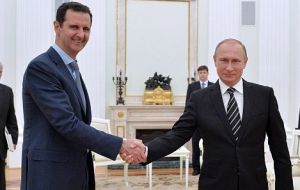MercoPress. South Atlantic News Agency
Ceasefire between Syria and rebels effective since midnight, but gunshots already reported
 Russian President Vladimir Putin (R), a key ally of Syrian President Bashar al-Assad (L), announced the ceasefire on Thursday after forging the agreement with Turkey
Russian President Vladimir Putin (R), a key ally of Syrian President Bashar al-Assad (L), announced the ceasefire on Thursday after forging the agreement with Turkey  Turkish President Recep Tayyip Erdogan described the agreement as a “historic opportunity” to end the Syrian conflict
Turkish President Recep Tayyip Erdogan described the agreement as a “historic opportunity” to end the Syrian conflict A ceasefire between Syria's government and rebel forces started at midnight on Friday after nearly six years of civil war. The agreement, brokered by Russia and Turkey which back opposing sides in the conflict, got off to a dubious start as clashes had already been reported less than two hours after the truce's beginning.
The incidents took place along the provincial boundary between Idlib and Hama, and there were also isolated episodes of gunfire further south.
Friday's truce is the third nationwide ceasefire deal agreed in Syria this year, and comes one week after troops aligned with Syrian President Bashar al-Assad regained full control of Aleppo from rebel fighters. The previous two ceasefires, negotiated by the US and Russia, held for only brief periods and allowed for humanitarian aid deliveries or for people to flee.
The current deal,in the waning days of President Barack Obama’s administration, was the first major international diplomatic initiative in the Middle East in decades not to involve the United States. It did not involve the United Nations either.
Russian Foreign Minister Sergei Lavrov said the United States could join the peace process once President-elect Donald Trump takes office on Jan. 20. He also wanted Egypt to join, together with Saudi Arabia, Qatar, Iraq, Jordan and the United Nations.
Russian President Vladimir Putin, a key ally of Syrian President Bashar al-Assad, announced the ceasefire on Thursday after forging the agreement with Turkey, a longtime backer of the opposition.
Russia, Turkey and Iran are set to act as guarantors for the deal. Putin said the parties were also prepared to start peace talks intended to take place in Astana, the capital of Kazakhstan. Syrian state media said late on Thursday that these talks would take place “soon.”
Turkish President Recep Tayyip Erdogan described the agreement as a “historic opportunity” to end the Syrian conflict, which has killed more than 310,000 people and forced millions from their homes.
The ceasefire would include about 60,000 rebel fighters. Several rebel officials acknowledged the deal, and a spokesman for the Free Syrian Army (FSA), a loose alliance of insurgent groups, said it would abide by the truce. One FSA commander was optimistic about the truce deal, the third serious attempt this year at a nationwide ceasefire. “This time I have confidence in its seriousness. There is new international input,” Colonel Fares al-Bayoush said without elaborating.
The truce excludes the militant “Islamic State” (IS) group and the formerly al-Qaeda-linked Fatah al-Sham Front or any factions linked to those jihadist groups, it was announced. But several rebel officials said the agreement did include the former Nusra Front - now known as Jabhat Fateh al-Sham - which announced in July that it was severing ties with al Qaeda. The powerful Islamist insurgent group Ahrar al-Sham meanwhile said it had not signed the ceasefire agreement because of “reservations,” which it would make clear in due course.
The previous two Syria ceasefires, brokered by Cold War foes Washington and Moscow, took effect in February and September but both collapsed within weeks as warring sides accused each other of truce violations and fighting intensified.
In Astana, the Syrian government will be negotiating from a strong position after its army and their allies, including Shi’ite militias supported by Iran, along with Russian air power, routed rebels in their last major urban stronghold of Aleppo this month. Moscow’s air campaign since September last year has turned the civil war in Assad’s favor, and the last rebels left Aleppo for areas that are still under rebel control to the west of the city, including the province of Idlib. Before talks can take place, the ceasefire will have to hold. According to the UK-based Syrian Observatory for Human Rights, the warring sides appeared to be holding to the ceasefire. The monitoring group said there had been some shellfire around Aleppo and close to the capital, Damascus, shortly before the truce went into effect.




Top Comments
Disclaimer & comment rulesCommenting for this story is now closed.
If you have a Facebook account, become a fan and comment on our Facebook Page!